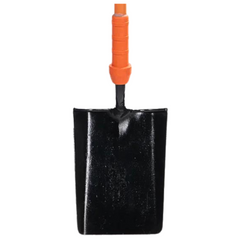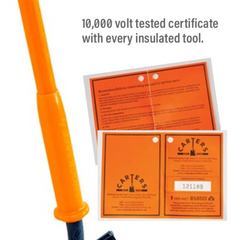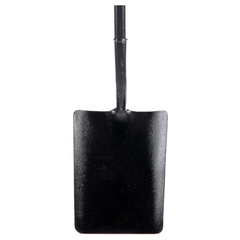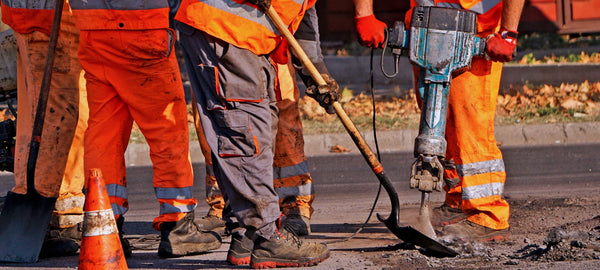Construction professionals depend on having the right tools to be effective, and shovels are crucial in any toolkit. However, deciding between insulated and non-insulated shovels can significantly impact safety, performance, and efficiency on-site. This blog post aims to explore the differences between the two types of shovels, so you can make an informed decision.
Let's dig in!
Every year, the Health and Safety Executive (HSE) receives reports of approximately 1,000 workplace accidents related to electric shocks or burns. This underscores the critical importance of using the right equipment and tools in potentially hazardous environments.
Insulated Shovel - Unmatched Protection:
Explore our range of insulated shovels and tool

An insulated shovel is a tool that's engineered with safety as a primary consideration. Designed for tasks near live conductor cables, providing a layer of protection against electrical hazards. The use of insulated materials in the shovel prevents electricity from being transmitted through the handle to the user, thereby ensuring safety when working in proximity to electrical lines or wet conditions. The use of an insulated shovel reduces the risk of arc faults and electric shock, making it a crucial choice for professionals operating in hazardous conditions.
Insulated shovels typically have a solid fibreglass core with polymer sheathing, offering protection against high voltage and abrasion. The shaft is commonly coated with polypropylene, a tough and flexible thermoplastic renowned for its electrical insulation properties. Additionally, these shovels are equipped with a rubber hand stop to prevent accidental contact with the steel blade, which can conduct electricity.
Tested to 10,000 Volts:

All insulated tools must adhere to the specifications detailed in BS8020:2011. Following production, each tool undergoes individual testing to ensure compliance with these standards. Before certification, each tool is subjected to a flash detection test, to 10,000 Volts. This process underscores the importance of maintaining safe working practices for individuals handling or working close to live conductor cables. It's a fundamental responsibility of all professionals to ensure they have the appropriate tools to mitigate the risks associated with working in potentially hazardous environments.
Non-Insulated Shovel - Versatile and Reliable:
Take a look at our wide array of shovels and digging tools

The non-insulated shovel is a reliable and cost-effective choice for general construction tasks, although it lacks specialised insulation. It’s also durable and popular among professionals and do-it-yourself enthusiasts alike. Its simplicity and ease of use make it a go-to choice for digging, lifting, and moving various materials on-site. Non-insulated shovels are commonly used for construction work where there is no risk of exposure to electrical currents.
Non-insulated standard shovels are commonly crafted from materials such as steel for both the blade and shaft, which can conduct electricity and therefore lack electrical insulation.
Durability:
In terms of durability, an insulated and non-insulated shovel serve different purposes and are designed for different applications:
An insulated shovel is a specialised tool built to withstand demanding conditions, offering longevity and reliability for workers who may come into contact with live wires or electrical currents. Ideal for tough jobs like digging narrow trenches for cables, drainage, and pipes. Insulated shovels have been engineered to be lightweight and robust, for the perfect balance between durability and safety.
On the other hand, a standard non-insulated shovel is durable in terms of handling general tasks such as digging, moving soil and other materials commonly encountered in construction, gardening, or landscaping. These shovels are built to withstand wear and tear from regular use in various environments.
So, if the primary concern is durability for general digging and moving tasks, a non-insulated shovel might be suitable. However, if there is a risk of electrical hazards in the work environment, the safety benefits of an insulated shovel will prove necessary.

Choosing the Right Tool for the Job:
- Project Requirements: Consider the nature of your construction project; If you're working near electrical lines or potential electrical hazards, an insulated shovel is a non-negotiable safety measure. However, if you primarily use a shovel for general tasks in safe environments, a non-insulated shovel may suffice
- Comfort and Ergonomics: Evaluate the design features of each shovel type, including handle grip, weight, and balance, to ensure comfort during prolonged use
- Cost-Effectiveness: While insulated shovels may come at a higher price point initially, the investment in safety and durability can result in long-term cost savings by reducing the risk of accidents and minimising tool replacement frequency
Conclusion:
As professionals in the construction industry, we know that every tool you use plays a crucial role in efficiency, safety, and overall performance on-site. The choice between an insulated and non-insulated shovel is no exception.
While the non-insulated shovel offers versatility and reliability for general tasks, the insulated shovel provides unmatched protection against electrical hazards, making it indispensable in certain environments. Understanding the specific needs of your project and prioritising safety is key in selecting the right tool for the job.
Looking for other types of construction tools? We’ve got you covered!
Browse our full range of construction and contractor site supplies
With thanks to:
https://shocksafe.uk/testing/



